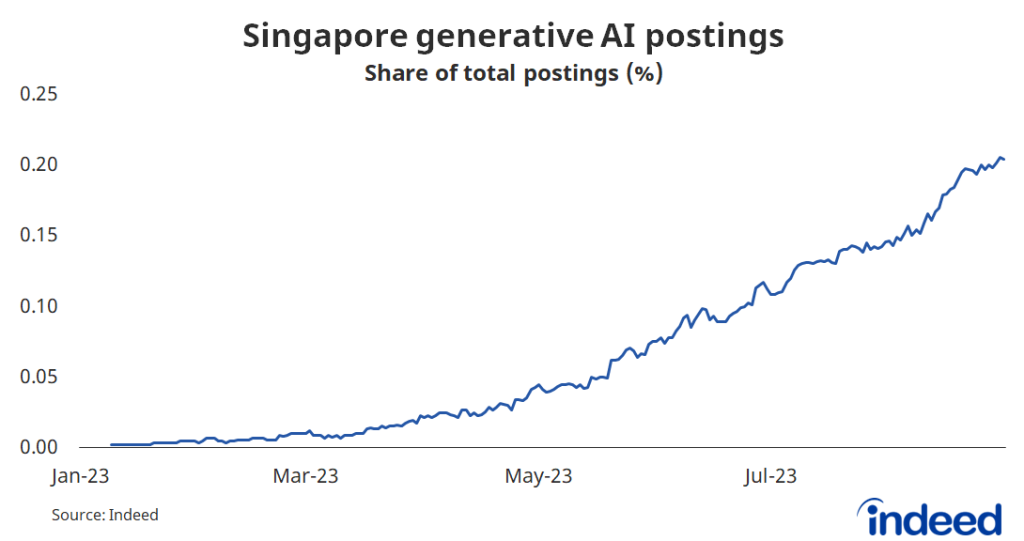Disclaimer: Opinions expressed below belong solely to the author.
2023 will be remembered as the year of artificial intelligence (AI) breaking its way into the mainstream, but not necessarily by making people redundant. Quite the contrary, new jobs and new skills are sought after with the rise of generative AI.
In Singapore, opportunities are quickly multiplying, according to latest data from the global employment website Indeed. From pretty much nil at the beginning of the year, postings have since began popping up at a geometric pace.

Floodgates are opening
While their number is still relatively small — as of September, one in 490 postings on Indeed contains a mention of such skills — the pace of growth is very high.
It may not seem like a big number, but it is rapidly increasing. Artificial intelligence is hardly new, but it continues to evolve.
This year, we’ve seen the emergence of large language models, such as ChatGPT, which create the illusion of real intelligence. These tools have the potential to fundamentally change the future of work and are already being incorporated into many Singapore jobs.
– Callam Pickering, APAC Senior Economist at Indeed
And they really are. There are nearly twice as many such offers as two months ago and a whopping five times compared to May, just four months back.
Soon, proficiency in AI tools will be just as obvious element of one’s CV as knowing how to use Microsoft Word or Excel. But what does it really mean to be proficient in AI?
One skill to rule them all
With new or updated AI tools being released every couple of months, it’s really hard to specialise in anything in particular.
ChatGPT is no longer just a chatbot, but has now gained the ability to see, hear, speak and even generate images on the fly, with the release of the third version of OpenAI’s Dall-E.
Dall-E, meanwhile, has spent the last 10 to 12 months in the shadow of Midjourney and Stable Diffusion which, in turn, have taken over from Dall-E 2, that was all the rage last year.
There isn’t a single solution you may specialise in to fulfil job requirements over the long run, as it may become obsolete in mere weeks, replaced by the latest version of something else.
30 years ago, people were largely expected to have a career for life, spending decades in one company.
This was later superseded by a trend of jumping jobs every few years — because people enjoyed new environments, but also due to increasing pace of change, driven in major part by technology. The way things were done started changing more rapidly.
With generative AI, it may soon be expected that you acquire new skills on order of months or weeks, staying abreast of the latest changes, or find yourself replaced by someone who can.
Technological adaptability — this is what you need to prove capable of, instead of checking boxes in a CV.
Basic skills that used to be expected of office workers were how to use a Windows PC and several programs of Microsoft Office suite. With a new release every couple of years, you might have been expected to learn about some of the latest features — but that’s about it. And you typically had an IT guy somewhere in the building to help you out if you didn’t quite know how to do something.
Paradoxically, with generative AI tools, this is nowhere near enough. Despite helping us, the technology is also imposing new requirements on human workers.
Telling ChatGPT what you want is hardly a skill, especially as it’s getting better at understanding our intentions, already threatening to make nascent jobs of prompt engineers redundant. Plus, you can’t really master something that itself remains a work in progress, with new features added every few weeks or months.
Knowing how to use AI is largely about tracking its ongoing evolution and exploring new tools for the benefit of your job and company.
AI is pushing humans to become more creative and proactive. You can’t just finish a course, get a certificate, and claim to be proficient at it. Those days may soon be over entirely.
Perhaps, it’s going to slow down with time, as the law of diminishing demand kicks in and the market matures, with several major players dominating it. It would be much easier if we knew what the standards are.
But today, if you want to stand out, you have to prove that you’re smarter not only than other candidates, but the AI bot helping you at your job — and that you know when to ditch it if something better arrives.
Otherwise, if it can already do a growing share of what you’re expected to, what is the value-added by your work?
Featured Image Credit: grop & eamesBot / depositphotos